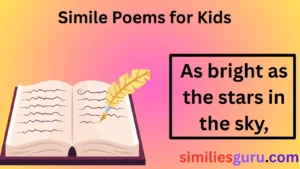Expressing emotions effectively is a cornerstone of communication, and fear is one of the most universal emotions we experience. Whether you’re writing a poem, crafting a story, or simply trying to convey how you feel, similes can be a powerful tool. Similes compare one thing to another using “like” or “as,” making descriptions more vivid and relatable. In this article, we’ll explore 10 similes for afraid, provide examples of similes in poems for kids, and offer casual alternatives to the phrase “similes for afraid.” Additionally, we’ll include 15 texting examples that are user-friendly and optimized for Google, ensuring they fit seamlessly into the article.
What Are Similes?
Before diving into the examples, let’s briefly define what similes are. A simile is a figure of speech that directly compares two different things, often using the words “like” or “as.” For example, “Her smile was as bright as the sun” is a simile because it compares a smile to the sun using the word “as.”
Similes are commonly used in literature, poetry, and everyday language to create vivid imagery and evoke emotions. They help readers or listeners visualize and connect with the subject matter on a deeper level.
Why Use Similes for Fear?
Fear is a complex emotion that can be difficult to describe. Using similes allows writers and speakers to convey the intensity, nature, and nuances of fear in a way that resonates with others. For instance, saying “I was as scared as a mouse in a cat’s den” paints a clearer picture than simply saying “I was scared.”
10 Similes for Afraid
Here are 10 creative and relatable similes to describe fear:
- As afraid as a rabbit caught in headlights
This simile captures the paralyzing nature of fear, much like a rabbit freezing when it sees bright lights. - As scared as a child in the dark
This evokes the universal fear of the unknown that many children experience. - As frightened as a bird in a storm
Birds are often seen as symbols of freedom, so this simile emphasizes vulnerability during chaos. - As terrified as a sailor in a hurricane
This simile highlights the overwhelming and uncontrollable nature of fear. - As nervous as a long-tailed cat in a room full of rocking chairs
A humorous yet vivid way to describe extreme anxiety or fear. - As fearful as a deer sensing a predator
This simile emphasizes instinctual fear and the fight-or-flight response. - As panicked as a fish out of water
This conveys the desperation and helplessness that often accompany fear. - As anxious as a student before a big exam
A relatable simile for anyone who has experienced performance-related fear. - As jumpy as a cat on a hot tin roof
This simile describes someone who is easily startled or on edge. - As scared as a ghost in daylight
A playful simile that contrasts the usual association of ghosts with darkness.
Examples of Similes in Poems for Kids
Similes are a fantastic way to introduce children to the beauty of language and poetry. Here are some examples of similes in poems that kids can enjoy and learn from:
- “The fog comes on little cat feet” – Carl Sandburg
This simile compares the quiet, stealthy movement of fog to a cat. - “My love is like a red, red rose” – Robert Burns
A classic simile that compares love to a vibrant rose. - “Her eyes were like stars” – Common in children’s poetry
This simile emphasizes brightness and beauty. - “The moon was like a ghostly galleon” – Alfred Noyes
This simile creates a spooky, mysterious image. - “The snow was as white as a blanket” – Common in children’s poetry
A simple yet effective simile that kids can easily understand.
Casual Alternatives to the Phrase “Similes for Afraid”
If you’re looking for casual ways to describe fear without using the phrase “similes for afraid,” here are some alternatives:
- Ways to say you’re scared
- Creative ways to describe fear
- How to express being afraid
- Fun ways to talk about fear
- Describing fear in everyday language
- Unique ways to say you’re terrified
- Everyday phrases for being scared
- How to talk about fear without saying ‘I’m scared’
- Expressing fear in a relatable way
- Creative expressions for feeling afraid
15 Texting Examples for Expressing Fear
Here are 15 user-friendly and Google-optimized texting examples that can be used to express fear in a casual, relatable way:
- “I’m so scared rn, like a mouse in a snake’s cage!”
- “This situation has me shook—like a leaf in the wind!”
- “I’m as nervous as a cat in a room full of dogs.”
- “This is terrifying, like a nightmare come to life.”
- “I’m freaking out—like a fish out of water!”
- “This is giving me chills, like a ghost story by the campfire.”
- “I’m as jumpy as a kangaroo on caffeine!”
- “This is so scary, it’s like a horror movie in real life.”
- “I’m as anxious as a squirrel in traffic.”
- “This has me sweating like I’m in a sauna of fear.”
- “I’m as scared as a kid alone in a haunted house.”
- “This is making my heart race like a marathon runner.”
- “I’m as panicked as a chicken without its head.”
- “This is so intense, like a rollercoaster with no seatbelt.”
- “I’m as terrified as a snowman in the sun.”
How to Choose the Best Simile or Expression
When selecting a simile or expression to describe fear, consider the following factors:
- Context: Is the situation serious, humorous, or somewhere in between?
- Audience: Are you speaking to children, peers, or a formal audience?
- Tone: Do you want to convey lightheartedness, intensity, or something else?
- Imagery: What visual or emotional image do you want to evoke?
For example, if you’re writing a children’s poem, a simile like “as scared as a child in the dark” would be more appropriate than “as nervous as a long-tailed cat in a room full of rocking chairs.”
Conclusion
Similes are a versatile and engaging way to describe fear, whether you’re writing a poem, texting a friend, or crafting a story. By using comparisons like “as afraid as a rabbit caught in headlights” or “as nervous as a student before a big exam,” you can make your descriptions more vivid and relatable. Additionally, casual alternatives to the phrase “similes for afraid” and texting examples provide practical tools for everyday communication



